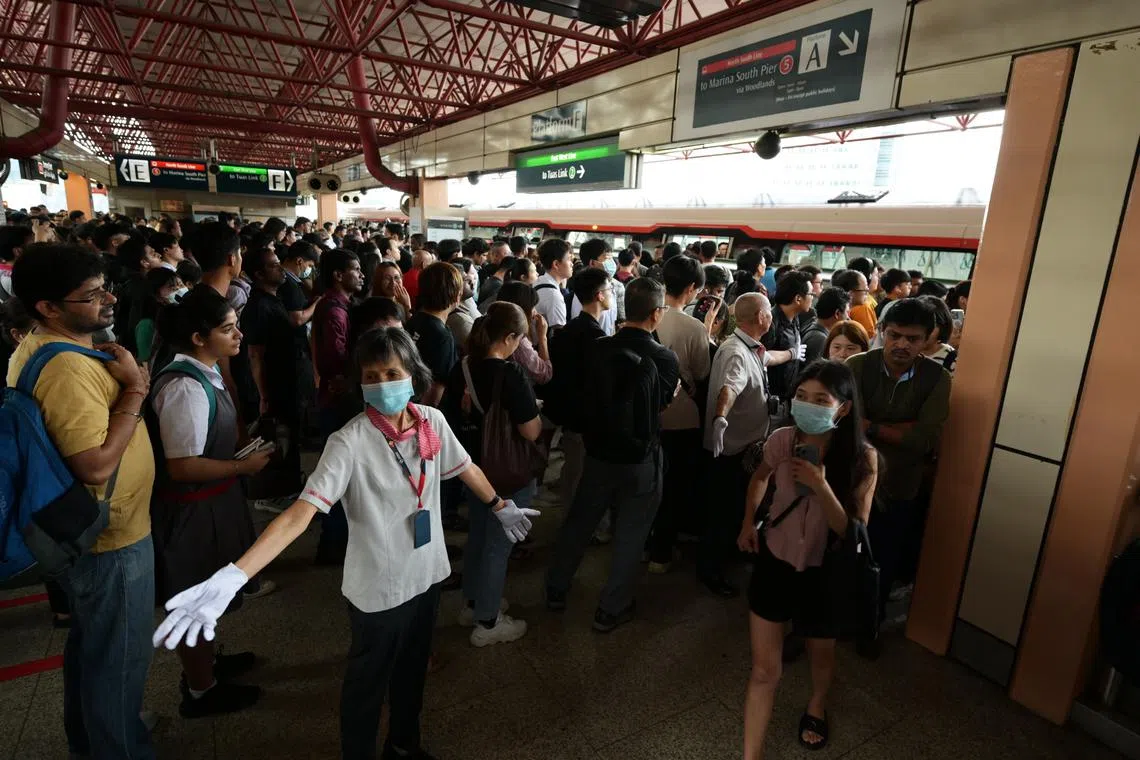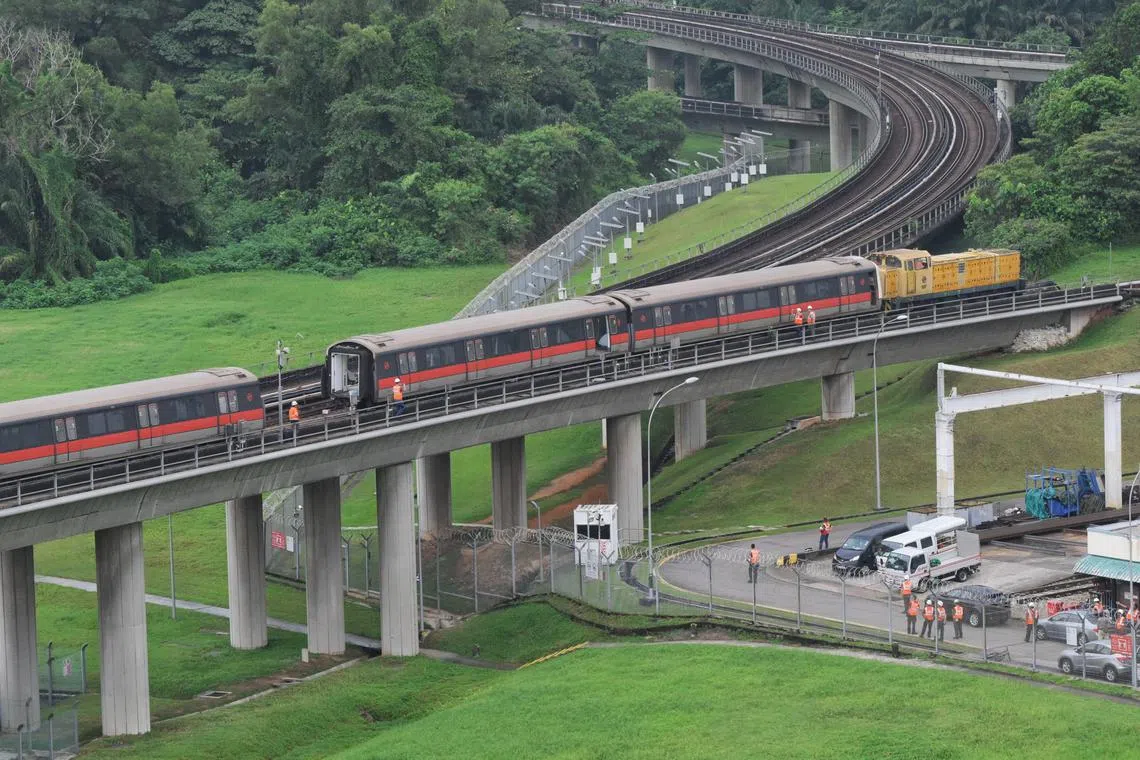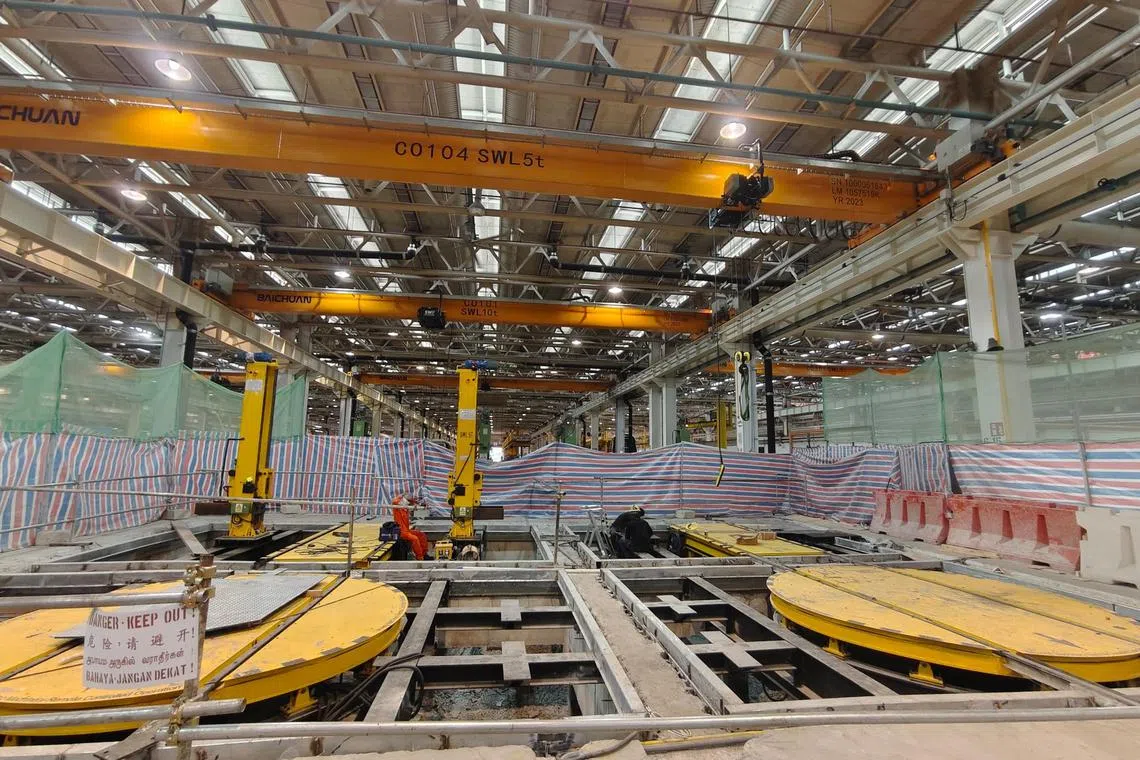SMRT’s finances hit by 2024 EWL disruption; profit after tax for trains division dips 8%
Sign up now: Get ST's newsletters delivered to your inbox

Commuters at Jurong East MRT Station boarding a shuttle train to Boon Lay MRT Station on Sept 30, 2024, when train services on the East-West Line were disrupted.
ST PHOTO: NG SOR LUAN
Follow topic:
- SMRT Trains' profit after tax fell to $6.9 million in FY2024/2025 despite a 4 per cent revenue increase, due to costs related to the six-day EWL breakdown in 2024.
- It was able to save more than $165 million via staff productivity initiatives, including $50 million in electricity costs.
- SMRT is also diversifying into new businesses like Strides Technologies, and it aims to launch driverless shuttles by early 2026.
AI generated
SINGAPORE – The costs associated with a major six-day disruption on the East-West Line (EWL
SMRT said on July 31 that its trains division turned in a $6.9 million profit after tax in the 12 months ending on March 31, 2025, representing a net profit margin of 0.75 per cent.
This is down from $7.5 million in profit after tax for the previous financial year, which translated to a net margin of 0.85 per cent.
SMRT, a wholly owned subsidiary of Singapore’s investment company Temasek, said revenue from its rail operations rose 4 per cent to $918.2 million in the 2024/2025 financial year, up from $886.7 million before.
This came on the back of higher average fares, which were raised in December 2024
But revenue growth was negatively impacted by a loss of income due to the EWL breakdown in 2024, which affected one in six train trips daily from Sept 25 to 30 that year.
For the six days of disruption, SMRT Trains provided free travel to passengers alighting at Jurong East and Buona Vista stations.
The rail operator was also hit by the expenses it incurred in providing free bridging and shuttle services, as well as repairing extensive damage caused to 2.55km of track and trackside equipment.
The cause of the disruption was later traced to a faulty part on a 37-year-old first-generation Kawasaki Heavy Industries (KHI) train.
It was reported that the total cost borne by SMRT for the 2024 EWL breakdown exceeded $10 million. This includes the $2.4 million fine levied by the Land Transport Authority (LTA) as a penalty for the service disruption.

SMRT's revenue growth was hit by a loss in income due to the East-West Line breakdown in 2024, which affected one in six train trips daily from Sept 25 to 30 that year.
ST PHOTO: MARK CHEONG
One silver lining was the more than $165 million in savings that SMRT was able to accrue from ground-up staff initiatives to improve productivity and safety.
The company said these savings helped to ease the financial pressure.
For instance, it was able to save $50 million in electricity costs through initiatives like optimising train energy use using data analytics, though this was offset by higher repair and maintenance costs, said SMRT chairman Seah Moon Ming.
Looking ahead, SMRT said it will complete an upgrade of the 39-year-old Bishan Depot in November, which will double the depot’s train overhaul capacity from two trains to four per month.
The project, dubbed Depot 4.0, is a joint initiative with CRRC Qingdao Sifang that will tap the Chinese train manufacturer’s expertise and leverage automation and digital solutions to improve maintenance quality.

Automated turntables installed at Bishan Depot as part of a $7 million upgrading project by SMRT, dubbed Depot 4.0, which will be completed in November 2025.
PHOTO: SMRT
CRRC Qingdao Sifang has produced trains for the North-South and East-West lines and the Thomson-East Coast Line in a joint venture with KHI, and it will supply trains for the upcoming Cross Island Line.
“Depot 4.0 will serve as a model for designing future depots and renewing existing ones, helping to future-proof our train depots against growing demands,” SMRT said.
SMRT Trains president Lam Sheau Kai said the $7 million Bishan Depot upgrade is being funded by the rail operator.
It involves renovation work to install automated turntables, which are used to turn trains to face a different direction. Robots will also be used to move heavy items like bogies, which are the wheeled structures underneath a train.
“What we’ve done is to redesign the existing area, improve the workflow and... bring in some automation,” Mr Lam said. “It allows me to concentrate my resources and, with the same team, double the output.”
In a joint message on July 31, Mr Seah and SMRT group chief executive Ngien Hoon Ping also flagged the need for SMRT to diversify into new business areas.
“MRT fares in Singapore are one of the lowest in the world while operational costs continue to rise,” they said.
In 2024, SMRT restructured its businesses into two pillars: the public transport business consisting of SMRT Trains and SMRT Buses; and the “non-fare” businesses comprising Strides, which offers engineering, digital and mobility services, and Stellar Lifestyle, which manages retail and advertising spaces.
Strides has since secured a six-year contract to provide transport services to the Elections Department, while the vehicle maintenance arm of taxi operator Strides Premier has inked deals with the likes of Changi Airport Group to service specialised fleets.
An entity called Strides Technologies has also been created to tap the company’s engineering know-how to sell “next-generation” rail solutions to the wider industry, including internationally.
One example is its Project Overwatch initiative, which uses artificial intelligence to monitor train services.
Strides Technologies is also the team involved in the Depot 4.0 redesign.
On the autonomous vehicle (AV) front, SMRT said it has actively advanced its expertise in the field.
Selected bus drivers have been trained to have the relevant AV operational skills, and a 2022 investment in self-driving technology company WeRide supports a broader strategy to implement driverless shuttles
Strides president Tan Peng Kuan said SMRT is exploring the launch of shuttle services with an AV manufacturer in one of the housing estates here by early 2026.
The company has visited South Korea and plans to head to China to find a suitable partner.
The Ministry of Transport has said that autonomous shuttles will be rolled out in Punggol by the fourth quarter of 2025, with Tengah the next location in mind.


